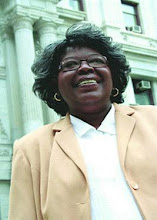
For many prisoners who are released from state and federal prisons, trying to “make it” on the outside is most times more difficult than doing time on the inside. Decent jobs are scarce, housing is next to impossible; and some families and friends struggle with accepting the return of their loved ones.
In a society that takes pride on giving people a second chance, it is hard to find someone who is willing to open their hearts and doors to someone fresh out of prison. Apparently, it is much easier to preach than it is to practice.
In spite of the pseudo liberals and the NIMBYites, a growing number of policymakers, government agencies, and nonprofit organizations have begun to focus on preparing incarcerated men and women for life after prison. This is something that Councilwoman Miller has been doing for decades.
Long before her career as an elected official, Councilwoman Miller has been an advocate for the rights of ex-offenders, and a driving force behind the creation of the Mayor’s Office of Re-entry; an agency that that provides the formerly incarcerated with help in transitioning from prison.
Philadelphia leads the rest of the state both in the number of people behind bars and the rate at which people are jailed. Critics of the prison system claim rates of recidivism are also among the highest in the Commonwealth because the emphasis has been on punishment rather than rehabilitation and reentry. “While we have made strides in helping ex-offenders remain ex-offenders, it’s still a challenge,” said Councilwoman Miller. "Now, with the current state of the economy, it’s even more of challenge."
Philadelphia leads the rest of the state both in the number of people behind bars and the rate at which people are jailed. Critics of the prison system claim rates of recidivism are also among the highest in the Commonwealth because the emphasis has been on punishment rather than rehabilitation and reentry. “While we have made strides in helping ex-offenders remain ex-offenders, it’s still a challenge,” said Councilwoman Miller. "Now, with the current state of the economy, it’s even more of challenge."
“If you think it is hard for the average worker who has never been to prison, imagine what it’s like for those who are just coming out of prison.” Miller added. “Today, it’s even more crucial for us to make these programs work.”
In a 2003 study by the Commonwealth of Pennsylvania, it was reported that, the typical returning prisoner was a 31-year-old African-American male, unmarried with at least one dependent, who had dropped out before completing high school. Those with multiple periods of incarceration were more likely to be black, single and have more dependents. They are also younger (29 compared to 32 years old), and tend to have higher levels of education attainment - although this difference may be due in part to repeated exposure to in-prison GED programs.

